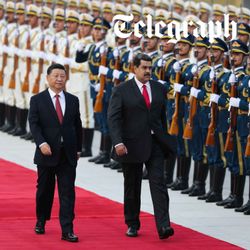Share

Battle Lines
'I bought a drone and killed my boss - it was easy'
•
As mysterious drone sightings near US military bases continue to unsettle anxious citizens, we look into what a new drone age means for the future of warfare. The flying objects have been defining the battlefield for a while, dominating the wars in Ukraine, Sudan and the Middle East. But now, with the advent of Artificial Intelligence, anyone can build an autonomous killer drone. So could this herald a new age of assassinations and mass destruction? How can it be controlled? And can it be kept out of the wrong hands?
The Telegraph’s Arthur Scott-Geddes tells Roland Oliphant how he turned a toy into an assassination device and why more conversation around containing this technology is needed.
More episodes
View all episodes

China’s sham election: Why Beijing is propping up Myanmar’s brutal junta
35:55|After five years of brutal civil war, Myanmar’s ruling military is holding an election that many say is a sham.But it has a major backer: China. So why is Beijing suddenly interested in democracy in this conflict-stricken country?Venetia Rainey and Arthur Scott-Geddes speak to the Telegraph’s Global Health Security correspondent Sarah Newey about her recent trip to Yangon and Joe Freeman, researcher for Amnesty International. Read Sarah's dispatch: https://www.telegraph.co.uk/global-health/terror-and-security/why-china-is-forcing-myanmars-junta-to-stage-an-election/Watch Sarah talking about scam centres in Laos: https://www.youtube.com/watch?v=6nRBG037FT0Producer: Sophie O'SullivanExecutive Producer: Louisa WellsStudio Operator: Meghan Searle► Sign up to our most popular newsletter, From the Editor. Look forward to receiving free-thinking comment and the day's biggest stories, every morning. telegraph.co.uk/fromtheeditorContact us with feedback or ideas:battlelines@telegraph.co.uk@venetiarainey@ascottgeddes
'Trump is damaging Nato': ex-commander speaks out on Greenland threats
39:31|With tariffs aimed at Europe over Greenland, Nato teetering on the brink and Donald Trump flexing military muscle like never before, this is geopolitics as a personal power play.Venetia and Roland are joined by the Alliance’s former Supreme Allied Commander Europe (SACEUR) Philip Breedlove who lays bare the strategic and moral fallout of Mr Trump’s actions and why he would refuse the order to invade Greenland if it came. The retired four star US Air Force general also reflects on the impact of America’s new National Security Strategy and the state of the Pentagon’s fleet of fighter jets. Plus, US correspondent Connor Stringer on what it’s been like having a front row seat to the president’s second-term storm, sharing what it is really like to cover an administration that is rewriting the international security architecture.Read David Blair on why this is a gift to Putin: https://www.telegraph.co.uk/news/2026/01/19/trump-handed-putin-prize-soviet-union-40-years/Read Tom Sharpe on why the US doesn’t need Greenland militarily: https://www.telegraph.co.uk/news/2026/01/18/us-never-needed-greenland-for-military-reasons/Producer: Peter ShevlinExecutive Producer: Louisa Wells► Sign up to our most popular newsletter, From the Editor. Look forward to receiving free-thinking comment and the day's biggest stories, every morning. telegraph.co.uk/fromtheeditorContact us with feedback or ideas:battlelines@telegraph.co.uk @venetiarainey@RolandOliphant
Trump wants to conquer Greenland. This is how Europe can stop him
39:07|President Trump’s talk of taking Greenland isn’t a joke, that much is now clear. His ambition to "conquer" the autonomous Danish territory is a direct challenge to the EU, Nato, and the post-Cold War security order - so what should Europe do?Roland chats to Rachel Ellehuus, head of British defence and security think tank RUSI and formerly a senior US official in Nato and the Pentagon. She explains why Greenland matters far more than most people realise: from missile defence and Arctic dominance to critical minerals and great-power competition. They also discuss why Trump’s threats should be taken seriously, how Denmark and Greenland are responding behind the scenes, and why this moment is critical for Europe if it wants to protect its values and way of life. To watch this episode on YouTube: https://youtu.be/96WiO6QE6WQArchive: PBS News. Picture credit: OLIVIER HOSLET/EPA/Shutterstock, BRENDAN SMIALOWSKI/AFPProducer: Peter ShevlinExecutive Producer: Louisa Wells► Sign up to our most popular newsletter, From the Editor. Look forward to receiving free-thinking comment and the day's biggest stories, every morning. telegraph.co.uk/fromtheeditorContact us with feedback or ideas:battlelines@telegraph.co.uk @venetiarainey@RolandOliphant
Iran ‘shooting to kill’: doctors fight back as Trump weighs intervention
36:56|Iran is in crisis. The price of bread has more than doubled, the currency has collapsed to record lows, and protests have erupted across the country. As security forces respond with deadly force, doctors inside Iran are being warned not to treat injured protesters and hospitals are buckling under the strain.In this episode of Battle Lines: Global Health Security, we go inside Iran’s overwhelmed healthcare system. We speak to Dr Kayvan Mirhadi, an Iranian-American doctor who has gathered testimonies from doctors across the country. Venetia and Arthur also speak to Dr Sanam Vakil from Chatham House to examine the deeper forces driving this moment: food insecurity, economic collapse, water shortages, women’s rights, and years of systemic mismanagement.Producer: Sophie O'SullivanExecutive Producer: Louisa WellsStudio Operator: Meghan Searle► Sign up to our most popular newsletter, From the Editor. Look forward to receiving free-thinking comment and the day's biggest stories, every morning. telegraph.co.uk/fromtheeditorContact us with feedback or ideas:battlelines@telegraph.co.uk@venetiarainey@ascottgeddesPicture credit: AP
Why Iran's regime is not finished (yet) and why Trump can't help
39:38|Since late December, Iran has been gripped by a wave of protests that began in Tehran’s bazaars over economic collapse and rapidly spread nationwide. Cash handouts failed. Brutal force followed. Internet cut. According to human rights groups, more than 500 people are dead and over 10,000 arrested. This is not another Tehran uprising. This time the anger is coming from small towns, poorer regions, and even the regime’s traditional supporters.As blood fills hospital corridors, the big question looms. Is this finally the end of the Islamic Republic? Venetia and Roland are joined by foreign correspondent Akhtar Makoii and Chief Foreign Affairs Commentator David Blair, to unpack what makes this moment different. From the historic role of the Grand Bazaar to the shocking violence on the streets, from young protesters paying with their lives to the absence of any clear opposition leader, the panel confronts a stark reality. The regime is determined to survive. And despite his threats, Donald Trump cannot simply bomb Iran into freedom. Military intervention could just as easily strengthen the regime, fracture the country, or trigger chaos far beyond Iran’s borders. Read Roland's analysis of the key signs to watch for: https://www.telegraph.co.uk/news/2026/01/09/iran-protests-regime-fall/And Roland examines Iran’s growing water crisis: https://www.telegraph.co.uk/news/2025/11/12/evacuate-tehran-the-catastrophe-threatening-iran/Read Akhtar's reporting on the protest victims: https://www.telegraph.co.uk/world-news/2026/01/10/they-protested-peacefully-iran-answered-with-bullets/Read David's analysis of the Ayatollah vs Trump: https://www.telegraph.co.uk/news/2026/01/12/ayatollah-iran-protests-trump/Pic credit: NEIL HALL/EPA/ShutterstockProducer: Peter ShevlinExecutive Producer: Louisa Wells► Sign up to our most popular newsletter, From the Editor. Look forward to receiving free-thinking comment and the day's biggest stories, every morning. telegraph.co.uk/fromtheeditorContact us with feedback or ideas:battlelines@telegraph.co.uk @venetiarainey@RolandOliphant
A US general on Trump, Greenland and Nato in crisis
49:13|As Washington openly floats the idea of asserting control over Greenland, a dramatic naval operation unfolds in the freezing waters between Iceland and northern Scotland. A Russian flagged tanker is seized in the Greenland Iceland UK gap, raising urgent questions about maritime law, alliance unity, and who really controls the North Atlantic sea lanes.At stake is something far bigger than a single ship. For the first time in its history, the transatlantic alliance is being pulled apart by the actions of its most powerful member. Could Nato survive a confrontation between allies, or are we watching the foundations begin to crack?Roland speaks to Ben Hodges, a former commanding general of the US army in Europe, about how Nato has handled internal disputes in the past and why this moment is different.And former Royal Navy commander Tom Sharpe explains what was on board the seized vessel, why it mattered, and what this incident means for the future of freedom of navigation.Picture credit: Katie Miller/X, Alex Wong/Getty ImagesRead David Blair's analysis: https://www.telegraph.co.uk/world-news/2026/01/06/usa-donald-trump-take-greenland-collapse-nato/Producer: Peter ShevlinExecutive Producer: Louisa Wells► Sign up to our most popular newsletter, From the Editor. Look forward to receiving free-thinking comment and the day's biggest stories, every morning. telegraph.co.uk/fromtheeditorContact us with feedback or ideas:battlelines@telegraph.co.uk @venetiarainey@RolandOliphant
How to deal with Trump, China and debt: the African country getting it right
25:47|As Donald Trump reshapes global trade and cuts foreign aid, countries around the world are being forced to adapt fast - and some leaders are doing better than others. Among them is Zambia's President Hakainde Hichilema, who was voted No. 5 in The Telegraph's World Leaders 2025 for turning his country into a prize both Trump and Xi Jinping covet despite enormous economic headwinds. The Telegraph's Ben Farmer visited Zambia to interview Hichilema about navigating Trump, China, aid cuts and debt. He tells Venetia and Arthur why Zambia has become a key battleground in the fight for resources such as copper. Read Ben Farmer's profile of Hichilema: https://www.telegraph.co.uk/world-news/2025/12/27/telegraph-world-leader-2025-hakainde-hichilema-zambia/See the full Telegraph World Leaders 20205 list: https://www.telegraph.co.uk/world-news/2026/01/01/telegraph-world-leaders-2025-readers-vs-the-panellists/Producer: Sophie O'SullivanExecutive Producer: Louisa WellsStudio Operator: Meghan Searle► Sign up to our most popular newsletter, From the Editor. Look forward to receiving free-thinking comment and the day's biggest stories, every morning. telegraph.co.uk/fromtheeditorContact us with feedback or ideas:battlelines@telegraph.co.uk @venetiarainey@ascottgeddes
Trump's Venezuela gamble: Why China, Russia and Iran just lost their foothold in Latin America
36:48|Two days on from Donald Trump’s extraordinary capture of Venezuelan leader Nicolas Maduro, the dust has barely begun to settle.Maduro is appearing today in a New York court where he will be charged with “narco-terrorism” and conspiracy to import cocaine, which can carry life sentences under US law.But Maduro is not the only loser in all of this. Iran, Russia and China have all lost a valuable client - one who sold them oil, bought their weapons, and provided them with a beachhead on America's doorstep. Venetia is joined by Dr Carlos Solar, a Latin American Security at RUSI, and Adrian Blomfield, The Telegraph's senior foreign correspondent, to discuss the downsides - and upsides - for America's enemies, the Monroe Doctrine's renewed relevance, and what will happen next. Pic credit: Marcelo GARCIA/AFPRead Adrian's analysis of what the capture of Maduro means for China and Russia: https://www.telegraph.co.uk/world-news/2026/01/03/venezuela-regime-change-russia-china-impact/Venezuela becomes Trump’s energy superweapon against China: https://www.telegraph.co.uk/business/2026/01/05/venezuela-becomes-trumps-energy-superweapon-against-china/Producer: Peter ShevlinExecutive Producer: Louisa Wells► Sign up to our most popular newsletter, From the Editor. Look forward to receiving free-thinking comment and the day's biggest stories, every morning. telegraph.co.uk/fromtheeditorContact us with feedback or ideas:battlelines@telegraph.co.uk @venetiarainey@RolandOliphant
Trump captures Maduro and takes over Venezuela: 'Welcome to 2026, America is back'
14:18|In the early hours of this morning, US President Donald Trump gave the order for the Pentagon to bomb Venezuela’s capital Caracas and capture Venezuelan leader Nicolas Maduro, along with his wife. Trump has just given a press conference in Mar-A Lago sharing fresh details. In this emergency bonus episode of Battle Lines, Venetia is joined by The Telegraph's Chief US Correspondent Rob Crilly to cover everything we know so far about how it all unfolded, why Trump has done this, and what might happen next. Producer: Peter ShevlinExecutive Producer: Louisa Wells► Sign up to our most popular newsletter, From the Editor. Look forward to receiving free-thinking comment and the day's biggest stories, every morning. telegraph.co.uk/fromtheeditorContact us with feedback or ideas:battlelines@telegraph.co.uk @venetiarainey@RolandOliphant